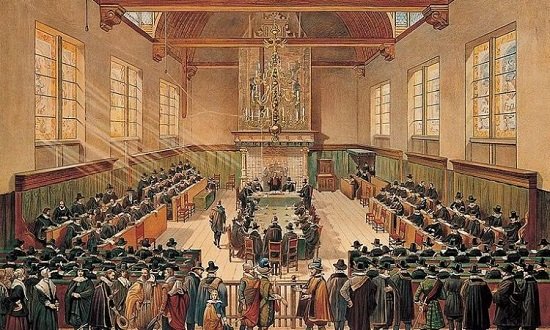"A Twofold Response to the Gospel" -- Article Four, First Head of Doctrine, Canons of Dort
Article 4: A Twofold Response to the Gospel
God’s anger remains on those who do not believe this gospel. But those who do receive it and embrace Jesus the Savior with a true and living faith are delivered through him from God’s anger and from destruction, and receive the gift of eternal life.
_______________________________________________
The Scriptures are very clear about human guilt before God. Article Four of the First Head of Doctrine briefly summarizes the many biblical passages which teach this. As difficult as this can be to accept, the wrath of God abides on all of those apart from Christ. Those who trust in Jesus Christ and his gospel will be delivered from the wrath to come. Here, the canons are laying the groundwork for the subsequent doctrine of election which follows (especially in articles 5-7). The point being made is that there are those who believe and receive the gift of eternal life, and those who do not believe and who face the wrath of God. There is no middle ground. Either you respond to the gospel in faith, or you do not.
We read in John’s gospel that, “whoever believes in the Son has eternal life; whoever does not obey the Son shall not see life, but the wrath of God remains on him” (John 3:36). However sincere our motives, we cannot offer the false hope to those apart from Christ that “God loves you and has a wonderful plan for your life,” as found in evangelical tracts such as the Four Spiritual Laws. This promise is true, but only for a believer in Jesus. But those apart from Christ have no such hope. Those who reject Christ and his gospel can only expect God’s wrath. A vague promise of God’s love is not helpful. Rather, people need to hear the law of God (his commandments), come to realize their sin and guilt before God (because they have broken these commandments), and thereby be stripped of all false hope of a personal righteousness which they mistakenly hope can sustain them on the day of judgment.
Paul addresses this very point in Romans 5:1-11 . . .
Therefore, since we have been justified by faith, we have peace with God through our Lord Jesus Christ. Through him we have also obtained access by faith into this grace in which we stand, and we rejoice in hope of the glory of God. More than that, we rejoice in our sufferings, knowing that suffering produces endurance, and endurance produces character, and character produces hope, and hope does not put us to shame, because God's love has been poured into our hearts through the Holy Spirit who has been given to us. For while we were still weak, at the right time Christ died for the ungodly. For one will scarcely die for a righteous person—though perhaps for a good person one would dare even to die—but God shows his love for us in that while we were still sinners, Christ died for us. Since, therefore, we have now been justified by his blood, much more shall we be saved by him from the wrath of God. For if while we were enemies we were reconciled to God by the death of his Son, much more, now that we are reconciled, shall we be saved by his life. More than that, we also rejoice in God through our Lord Jesus Christ, through whom we have now received reconciliation.
In this passage, Paul sets out God’s promise that while we were sinners and unable to do anything to save ourselves, God sought us in Christ, taking away the guilt of our sin, which was the ground of God’s estrangement from us and our estrangement from God. Remove the basis for God’s anger toward sinners and only then can peace between the estranged parties can be restored. It is only in Christ’s saving work that God saves us from his own wrath, and it is through the death of Christ that he reconciles himself to us, and then us to him once the guilt of our sin is removed. This is what it means to have peace with God. The war between sinners and God is over.
But those who are not Christ’s know no such peace and it is not right to hold out false assurances to them. Theirs is but the pursuit of the passing pleasures of sin. Theirs is but the false wisdom of this present evil age. They are without hope and without God in the world. They are separate from Christ and foreigners to the covenant of promise (Ephesians 2:11-22). The wrath of God abides on them as Jesus says (John 3:36). There is no more horrible state imaginable then that which results from human sinfulness and not believing the gospel of Jesus Christ.
For the Christian, it is not the law (and the word of condemnation), but the gospel (the word of promise) that has the last word. Those who are Christ’s through faith are heirs to all of the promises of God. In Christ, we are given eternal life, we are justified, and we can know our sins are forgiven—no matter how great the guilt of them seems to us. In Christ, we are adopted as God’s sons and daughters. In Christ we will inherit all the riches that are found in him. In Christ, therefore, we live and die in the unspeakable comfort of the hope of heaven which comes with the gift of eternal life.
All we must do is receive that gift of eternal life which God offers to us in his son with the empty hands of a living faith—simply trusting that the son of God loved us and gave himself for us to reconcile us to God.
